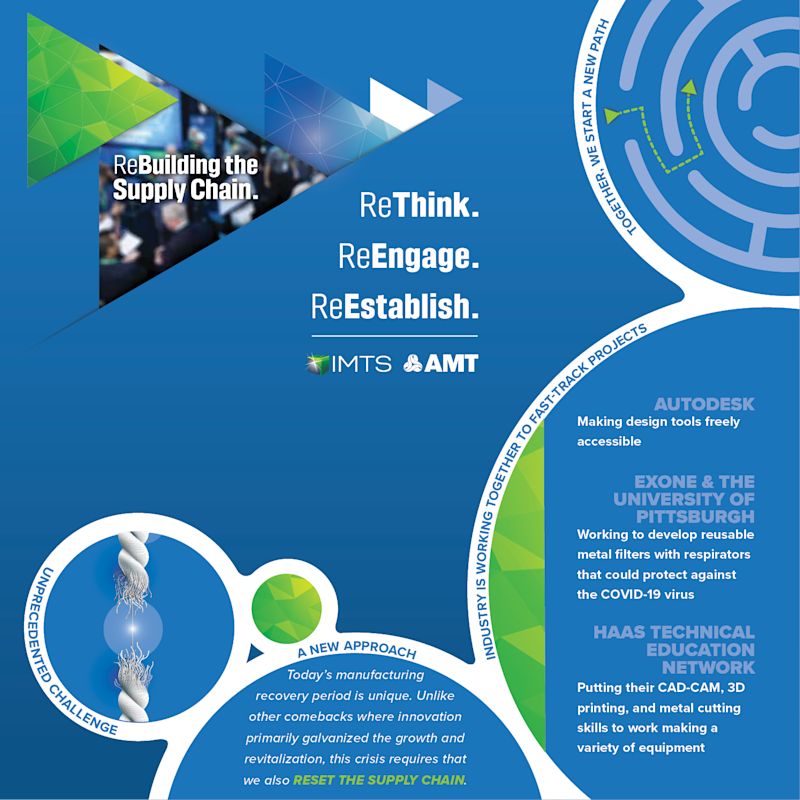Opportunities radiate from the cracks of broken supply chain.
COVID-19 hits hard.
Six months ago, the United States received the first reports of a novel coronavirus outbreak in the Wuhan province of China. There was little to differentiate this from the mile-a-minute news cycle serving as background noise and no clear sense that it would dramatically impact our businesses and daily lives.
As this public health crisis expanded from a regional issue to make landfall in Europe and North America, domestic governments began to implement mitigation strategies, calling for social distancing and closing public spaces and businesses.
These measures have hit manufacturing hard, derailing one of the strongest global economies in history. However, since the founding of our country, manufacturing has endured challenging circumstances and has a history of emerging from them even stronger.
In the past century, from the Great Depression and World War II to 9/11 and the Great Recession, manufacturing’s inherent nature for technological innovation and responsiveness consistently contributed to the industry rebounding.
Manufacturing hits back.
Many advanced technology companies and institutions have reacted quickly to help in the crisis. From manufacturing technology businesses to OEMs and tech-ed programs, our industry is working together to fast-track projects and restructure customer service.
Autodesk has made their design tools freely accessible, including 360 Design, Fusion 360, Fusion Team, and AutoCAD, to give the community access to the tools they need to design new parts. Hexagon Manufacturing Intelligence is offering free offline licensing, remote access options, and online learning tools.
Additive manufacturers like Protolabs, Stratasys, and Xometry are 3D printing a wide range of coronavirus-related items, such as face shields, temperature- measurement devices, masks, visors, and ventilator parts. Materialise released files for a 3D-printed, hands-free door handle attachment to alleviate germ transmission via door handles.
ExOne and the University of Pittsburgh Swanson School of Engineering are working to develop reusable metal filters with respirators that could protect against the coronavirus.
Across the country, high school to graduate programs within the Haas Technical Education Network are putting their CAD/CAM, 3D-printing, and metal-cutting skills to work making a variety of equipment, including respirator masks, ventilator components, and face shields for their local healthcare workers and first responders.
In just 12 days, good old-fashioned American ingenuity helped Airon Corp., a small Florida manufacturer, quickly partner with Ford and GE Healthcare to fast-track a ventilator production agreement to help healthcare workers fight COVID-19.
Of course, many more businesses, schools, and organizations have adjusted workforce strategies, production tooling, and sourcing to combat and advance through this unprecedented challenge.
Resilience and recovery
History has shown us that manufacturing thrives on resiliency, just as the human body does. After enduring stress, a recovery period allows our muscles to grow stronger than before, just like the muscle of U.S. manufacturing.
Today’s manufacturing recovery period is unique. Unlike other comebacks where innovation primarily galvanized growth and revitalization, this crisis requires that we also reset the supply chain.
At first look, it appears as if the 2019 tariffs and COVID-19 created the supply chain weakness. Long links were stretched and broke, exposing our dependence on offshore sources.
However, the supply chain was already fragile. A perfect storm had been brewing for nearly half a century. How did we come to rely so heavily on other countries?
From the 1940s to the 1970s, the U.S. machine tool industry was at the heart of U.S. manufacturing and led the world in both machine tool production and consumption. After WWII, the United States had a phenomenal trade surplus. A series of short-sighted monetary policies brought the U.S. surplus to zero by 1979.
From the 1980s to the 2000s, supply chains were unintendedly weakened due to administration goals on higher education and international trade policies as well as legislation and shifts in business philosophy focusing solely on price.
Luckily, since the late 2000s, administration policies, new trade agreements, legislation, and businesses have focused on strengthening the U.S. industrial base. Strides forward include tax breaks on capital investment, the creation of funds for technical education, high-skilled apprenticeships, and Manufacturing USA (formally the National Network for Manufacturing Innovation). These efforts encourage a secure U.S. global leadership in advanced manufacturing.
Manufacturing will hit back harder.
The deep crevasse in the broken supply chain shines a bright light on new opportunities and the strategies that will work.
Some manufacturers are fulfilling new orders, collaborating, innovating, and easily retooling thanks to digital manufacturing. Others are analyzing their products and services, determining streamlined operational processes, and developing reorganization strategies to determine their post-COVID-19-crisis business approach.
Regardless of your situation in these past months, one certainty remains: every manufacturer in the United States is rethinking ways to rebuild the supply chain.
Whether you are an advanced manufacturer, job shop owner, or OEM, AMT and IMTS are committed to supporting you as we rebalance supply chains. We are dedicating significant staff and financial resources to help you rethink, reengage, and reestablish supply chains.
As manufacturers move forward with supply chain concerns top of mind, AMT and IMTS are poised to play a critical role. Through the breadth and depth of our resources, OEMs and job shops can explore ways to shorten and rebalance supply chains to mitigate risk without sacrificing profitability, find qualified suppliers, implement multi-sourcing strategies, learn the government’s role in such initiatives, and explore how reshoring or nearshoring can lower total costs and enable an agile response.
“We are eager to help our community through this crisis by getting you what you need. With strengthened supply chains and digital manufacturing implemented, I sincerely believe we are going to see new levels of agility, productivity, and profitability,” says AMT President Douglas K. Woods.
Visit IMTS.com/SupplyChain to learn more.






